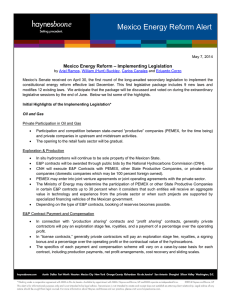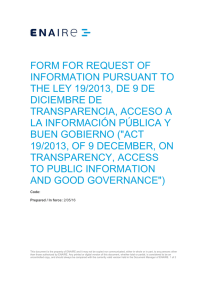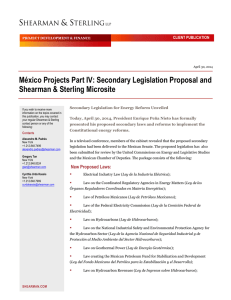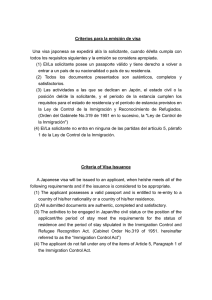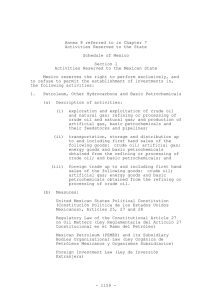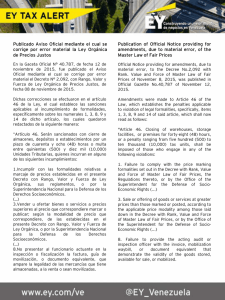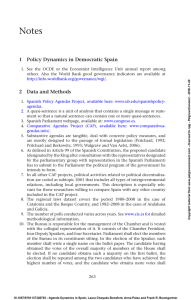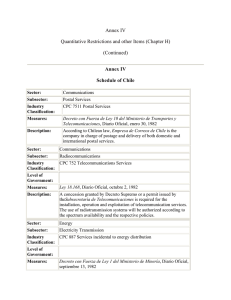mexican energy reform: how will it affect global business?
Anuncio
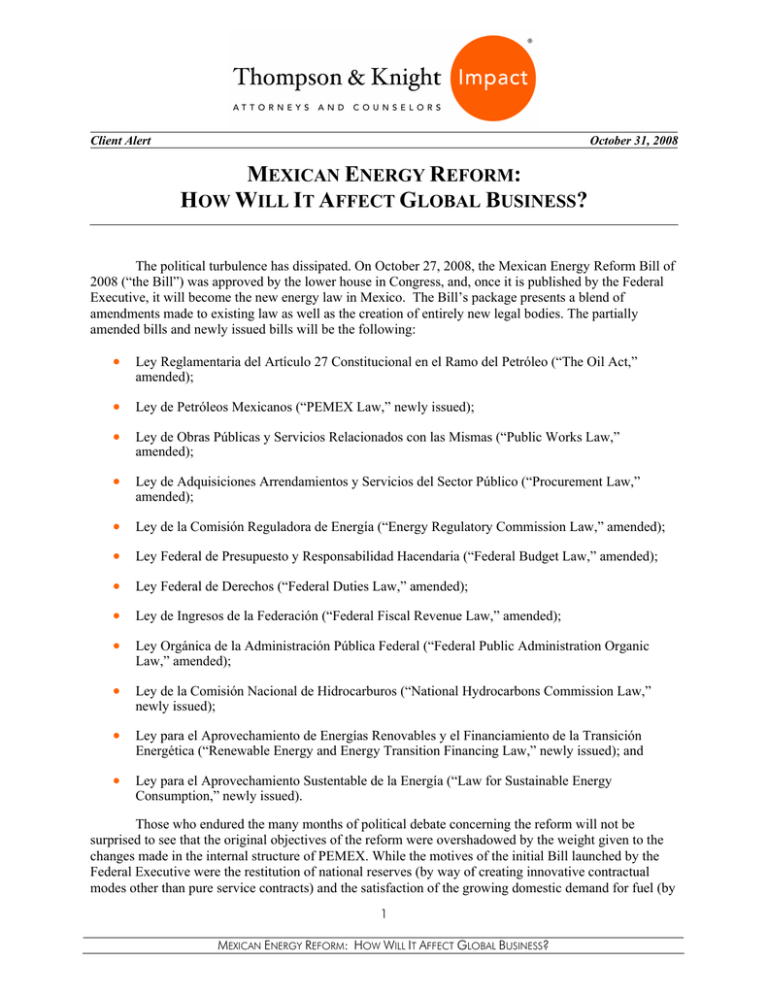
Client Alert October 31, 2008 MEXICAN ENERGY REFORM: HOW WILL IT AFFECT GLOBAL BUSINESS? The political turbulence has dissipated. On October 27, 2008, the Mexican Energy Reform Bill of 2008 (“the Bill”) was approved by the lower house in Congress, and, once it is published by the Federal Executive, it will become the new energy law in Mexico. The Bill’s package presents a blend of amendments made to existing law as well as the creation of entirely new legal bodies. The partially amended bills and newly issued bills will be the following: • Ley Reglamentaria del Artículo 27 Constitucional en el Ramo del Petróleo (“The Oil Act,” amended); • Ley de Petróleos Mexicanos (“PEMEX Law,” newly issued); • Ley de Obras Públicas y Servicios Relacionados con las Mismas (“Public Works Law,” amended); • Ley de Adquisiciones Arrendamientos y Servicios del Sector Público (“Procurement Law,” amended); • Ley de la Comisión Reguladora de Energía (“Energy Regulatory Commission Law,” amended); • Ley Federal de Presupuesto y Responsabilidad Hacendaria (“Federal Budget Law,” amended); • Ley Federal de Derechos (“Federal Duties Law,” amended); • Ley de Ingresos de la Federación (“Federal Fiscal Revenue Law,” amended); • Ley Orgánica de la Administración Pública Federal (“Federal Public Administration Organic Law,” amended); • Ley de la Comisión Nacional de Hidrocarburos (“National Hydrocarbons Commission Law,” newly issued); • Ley para el Aprovechamiento de Energías Renovables y el Financiamiento de la Transición Energética (“Renewable Energy and Energy Transition Financing Law,” newly issued); and • Ley para el Aprovechamiento Sustentable de la Energía (“Law for Sustainable Energy Consumption,” newly issued). Those who endured the many months of political debate concerning the reform will not be surprised to see that the original objectives of the reform were overshadowed by the weight given to the changes made in the internal structure of PEMEX. While the motives of the initial Bill launched by the Federal Executive were the restitution of national reserves (by way of creating innovative contractual modes other than pure service contracts) and the satisfaction of the growing domestic demand for fuel (by 1 MEXICAN ENERGY REFORM: HOW WILL IT AFFECT GLOBAL BUSINESS? Client Alert October 31, 2008 allowing public-private participation in the construction, ownership, and operation of refining infrastructure), such motives were consumed by the political heat brought on by the intent of widening the spectrum of private participation in the oil and gas industry. As expected, the central focus of the reform is on the internal structure, operation, auditing, budget, and corporate governance of PEMEX. The principal changes included in the new PEMEX law (“the Law”) are: • Concerning contracts related to productive activities of the hydrocarbon industry, procurement shall be subject to the rules established in the Law and to the rules issued by the Board of Directors, rather than to the general procurement framework applicable to other public entities. • The public bids carried out in accordance with the Law shall include stages in which contract prices may be negotiated pursuant to the rules issued by the Board of Directors. • Contracts may include clauses that allow amendments to such contracts in order to include price adjustments as a result of the inclusion of more advanced technology in the project, variations in market prices of supplies and equipment, and the acquisition of new information that may increase efficiency in the project. • Clauses concerning prices may establish additional compensation when the contractor saves time in the performance of the works as a result of PEMEX benefiting from better technologies or from greater value in the project. This notwithstanding, the text of the Law affirms and clarifies the well known prohibitions that circumscribe private participation in E&P in Mexico to mere service contracts. Contractors may not gain any form of title on the reserves, and price compensation shall be paid strictly in cash, barring the possibility of agreeing on payment by way of percentages of production, sales take, or oil revenues of PEMEX. In accordance with these prohibitions, the Law expressly bars production sharing agreements, risk service, and other similar agreements. This client alert is sent for the information of our clients and friends. It is not intended as legal advice or an opinion on specific circumstances and is not intended or written to be used, and may not be used, by any person for the purpose of avoiding penalties that may be imposed under United States federal tax laws. The lawyers at Thompson & Knight are available to assist you in working through any of these topics. Please contact the Thompson & Knight attorney with whom you regularly work or any of the following attorneys for assistance. CONTACT INFORMATION: Gabriel Ruiz Thompson & Knight, S. de R.L. de C.V. ING Torre Comercial América - Piso 30 Batallón de San Patricio No. 111 Colonia Valle Oriente. San Pedro Garza García, N.L. C.P. 66269 México +52 81.8215.7724 Gabriel.Ruiz@tklaw.com Miriam Grunstein Thompson & Knight Abogados, S.C. Paseo de las Palmas 405 1901 Lomas de Chapultepec C.P. Miguel Hidalgo México, D.F. 11000 México +52.55.5002.8104 Miriam.Grunstein@tklaw.com 2 MEXICAN ENERGY REFORM: HOW WILL IT AFFECT GLOBAL BUSINESS?

